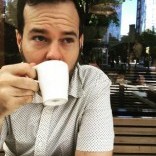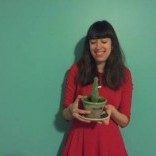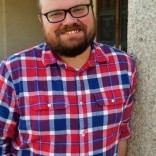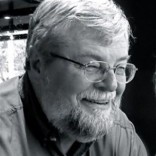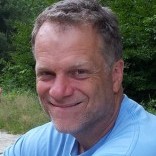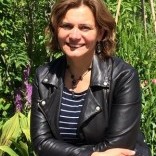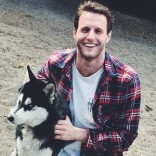The Birth of Athena
Sarah Starr Murphy
It was the vast, open expanse of sky that made Eileen feel like a mouse sensing a hawk. One hand on the warm steel of the tractor, her gaze swept to the herd. The cows had seen the circular bale of hay drop into the feeder. From the far end of the field, they began ambling towards the food. Spooked by something unseen, they broke into a lurching run, the bulk of their bodies ploughing graceless through the air. They hit the ground so hard that it seemed either the earth or their legs must shatter.
There they were, sun-warmed hides, flicking tails, long pink tongues. They surrounded the feeder, pushing and shoving, tilting their heads to get through the slanted bars. Clouds of flies descended and rose, following their own rhythm. Eileen felt the herd settle around her, their fright forgotten. She let the warm rays of the sun slide over her face and neck, tendril down the front of her t-shirt. The heat reached her sweating feet in thick rubber farm boots, warmed the damp fabric of her jeans. There was no hiding from the gods here, in the middle of the field. She was vulnerable; she surrendered.
A cow bellowed but Eileen did not startle. She peered up, neck bent so far back that her vertebrae touched through skin. Something dark moved across the sky, just at the limits of her vision. There was something up there. No, not something, somegod.
The breeze stirred, fluttered the ends of her hair. She straightened, looked around, but there were only cows, green pasture, and the barn. In the field beyond was the promise of corn, spears of dark green, stretching in converging rows to the distant trees. She did not see anyone, although of course the gods often appeared as animals. And sometimes, they were invisible altogether. Gods didn’t have to follow anyone’s rules.
Eileen patted the flank of the nearest cow, black and warm from the sun, muscle taught underneath. A hawk screamed and she spotted it circling high at the end of the field. Freya, the Norse goddess, was known to transform into a falcon.
Eileen started the tractor and eased away from the cows, who watched her go. Curious creatures, cows. Eileen knew what it was like to feel befuddled by the wide world around you. She was homeschooled, or she had been until this spring.
In February, Mother had provided a few collections of ancient myths as a continuation of their classical curriculum. Eileen and her sister Alice had passed the books between them. Alice enjoyed the stories as Mother had intended, a fictional diversion from farm life. Eileen read them overnight, not stopping to sleep, the web of connections spiraling out from her brain until she was pained by its brilliance.
Christianity fell into place as a cheap imitation of the richness that had preceded it. Who was Mary, other than the goddess of women and childbirth? She was impregnated by a god and dragged into the realm of the immortals, like so many before her. Zeus alone loved enough mortal women to create his own baby boom of heroes, Hercules and Perseus among them.
“Eostre is the Norse goddess of spring,” Eileen had said to her parents.
There had been a long moment of silence in the early-morning kitchen sunlight, and Father had glared at Mother, then Eileen. Alice sat silent and overlooked, but her eyes were on Eileen.
Mother shifted in her chair. “They’re just stories, Eileen.”
“People believed in these gods.”
“One God is all you need,” Father said, “And there is only one God. Anything else is blasphemy and I won’t have it.”
“But the saints.”
“No,” Mother had said, eyes sparking with indignation. “They’re saints, not gods. There is only one God.”
Father had slammed a fist into the table, stood and stormed out of the room. Mother began to catechize, insistent prose beating against Eileen’s ears. Her voice held a faint undercurrent of terror, that a frivolous lesson could have gone so far awry.
After that, the books of myths had disappeared, and the girls’ education was declared complete. Eileen returned to giving appropriate answers, professed her belief in the one and only God. It was shocking, the ease with which she could lie. She read the Bible aloud to Mother every night after the last milking. She hid the knowledge that there was no return from the eating of the apple, or the pomegranate. Eileen knew now of the trickster and sinner gods, the all-seeing and the hopeless. She searched for these new-old gods, in the Aegean expanse of sky, in the dark tangle of forest.
~
After parking the tractor, Eileen headed to her personal domain, the kitchen garden. She shut the gate behind her so that the chickens couldn’t get in. They ate bugs, but they would also scratch up the roots of tender new plants. She weeded lettuce, thinned carrots. She chose the biggest and strongest to keep growing, discarded the weak into the compost. The bedroom window slid open, and Mother called out.
“Eileen! There you are. Come inside, it’s time.”
Eileen wanted to ask time for what, but she knew, and there was no delaying. She brushed the dirt from her jeans and walked into the house. Eileen entered the bedroom but stood just inside the door, pressed against the wall. She placed her palms flat on its wrinkled wallpaper.
Her sister Alice let out a panting grunt, sprawled on the bed. She groaned, and the sound vibrated through Eileen’s clenched teeth. The room was thick, hot with the iron tang of blood. Alice’s legs were wide, knees bent, and Mother hovered in-between.
“Come on, darling, one more push, and that should do it.”
Alice screamed, but low.
“There we go, there we go, one more and you’ll be done,” Mother called.
Eileen looked out the window, to a patch of pale blue sky.
Alice panted and then shrieked again, and Mother gasped.
“There it is, there she is, oh, there she is.”
The baby cried, the scratched sound wobbly and thin.
“Eileen, the blanket.”
Eileen took the small yellow blanket off of the dresser and handed it to Mother. Alice was crying, her sobs competing with the baby’s wails. Mother was holding something small, red, and furious. Its limbs jerked about and a thick, twisted purple cord erupted from its stomach.
Mother set the baby on the bed and took a piece of string from the dresser. After tying it off, she closed the kitchen shears over the cord, sawing until it was severed. Atropos, who cuts the thread of life, Eileen thought. Mother fussed around the baby, wrapped her in the blanket, and handed her to Alice. Alice, face blank, looked down at the creature on her chest. Eileen stood, watching.
“Well, go on,” Mother said, “Go tell Father.”
Eileen made sure the door latched on her way out.
Father was out in the pig pen, where Eileen had known he would be.
“The baby’s born,” she said, as he slopped the pigs.
He grunted.
“Another girl,” Eileen said.
“Praise God,” he said. Pigs grunted, rooted around for the slops. There were crusts of bread, some curdled milk and a handful of radish tops in the trough.
“What are you waiting for?” Father asked, “It’s almost time for milking.”
Eileen felt the waning afternoon sun on the back of her head as she walked to the milking barn. Isis was the Egyptian goddess most closely associated with milk and nursing. The pharaohs drew their immortality from her breasts. Eileen thought of her sister Alice’s breasts, how they would become swollen, painful, and hard with milk. She swung open the back door of the barn and the cows came clattering inside. Their udders were heavy as they plodded to their stanchions. Eileen cleaned their teats and attached the milking machines.
As she finished her tasks, Eileen heard Mother call. She left the door to the barn open and approached the house. The barn and the house were close enough to be within shouting distance but far enough apart that if one caught on fire, the other wouldn’t.
“I need you to take this,” Mother said, handing her a metal bowl with a red checked dishtowel on top, “it’s the afterbirth.”
Eileen took the bowl, feeling warmth emanating from within.
“What do I do with it?”
“Oh, for heaven’s sake, Eileen, you bury it. Out where we put the dead livestock. And make sure you cover it with a rock, so no coyotes dig it up.”
“What did she name the baby?”
Mother huffed, making her sweaty bangs flutter. “Fool wants to call it Athena.”
“Athena?” Eileen tightened her grip on the bowl, pierced by her sister’s daring.
“She’ll be christened Jane. That’s what Father wants. Your sister doesn’t know what she’s saying.”
Eileen clutched the gift of the name to herself as she crossed the path toward the barn. She glanced at the kitchen garden and realized she had left the gate open. Chickens were everywhere, clawing with their dinosaur feet. Eileen hesitated, then left the bowl on a low stone wall, the silver of it glinting in the sun. She ran to save the tender greens from the hens.
By the time Eileen returned, the bowl was on the ground, the dishtowel waving like a flag, stuck in some brambles. Two vultures hunched over something slick and purple on the ground.
Eileen charged, and at the very last minute the Valkyries took off, lumbering up into the sky with ponderous wingbeats. She stopped short and looked at the ground. There was some blood, and a few reddish clumps in the dirt. There was not much left, but she scooped what she could back into the bowl with her hands.
Eileen carried it out to the furthest field and dug a hole, tossed in the mess and the dishtowel, tamped the dirt back down. She took a large, flat rock off of the wall. It was covered in lichen and much heavier than it looked. She placed it with precision, and then stood and stared up at the sky. The gods were watching, but they wouldn’t interfere in human business unless there was something in it for them. If Alice’s suffering didn’t bring them down, what did Eileen have to offer?
The door was open, allowing the early summer air to flood the house. Still, the stench of birth was overwhelming, filling Eileen’s throat. She walked down the short hallway to the bedroom. Alice hadn’t moved from her spot on the bed, but her legs were down under the blanket. Father was chopping wood outside and the noise thudded through the room.
Alice looked up. She wore her defiance like a gauze veil, slippery and close to invisible.
“Take her,” she said, offering up the baby. “Take Athena.”
Eileen walked over and took the baby in her arms. She was sleeping, soft and pink, and Eileen sat with her on the faded velvet armchair by the window.
“He hates the name,” Eileen said.
Alice blinked. “I know.”
Light filtered through the window, and the wind rippled the curtains so their shadows flickered on the old wallpaper.
“I’m sorry,” Eileen said, “that he hurts you.”
Alice shook her head. “I’d do anything to protect you. And her.”
The sisters sat, looking at the small reddish face, swaddled in Mother’s yellow blanket.
“Take her outside,” Alice said, “and show her our sky.”
Eileen carried the baby, so light it would be possible to drop her and not notice. She took the baby past the bathroom, which smelled of bleach, and into the bright sun. The baby squirmed when the sun hit her face, then stilled, blue eyes wide.
Eileen felt the Valkyries circling, picking sides and choosing who would die. She felt the tricksters lurking in the distant woods, heard the armored clink of heroes preparing for battle. Should Eileen dip the baby in a protective well? Should she make deals with inanimate objects, beg them not to harm this new life?
Eileen walked toward the thud of the axe. The sound grew heavier, louder, syncopating with her footsteps. She stepped into view and Father, axe above his head, paused. The silver of the axe flashed in the sun.
“Her name is Athena,” Eileen said.
Sweat ran down his face, and for a moment she was sure he would throw the axe. Father was a duplicitous, cheating god whose will must be obeyed. Sacrifices must be offered.
He only grunted and let the axe fall heavily on its target, a piece of cedar that jumped apart as if it had never grown so tightly bound together.
“There is,” he panted as he picked up the pieces and tossed them on the pile of split wood, “only one God, Eileen.”
Eileen turned her back on him, listening for the whistle of the axe. She looked down at the face of the baby, and she whispered her blessing.
“There are more gods than anyone can dream, and some of them are even good.”
Gods circled overhead and Eileen tucked the blanket tighter around the baby. It was her duty to protect Athena, until the day she rose in golden, armored glory and set the world aflame.

